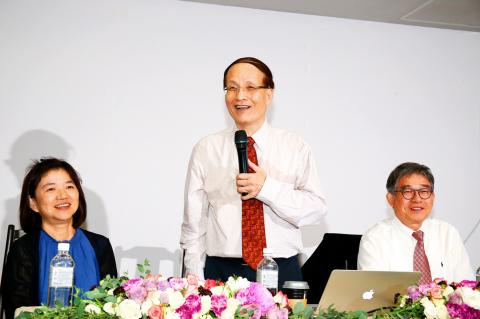The National Palace Museum (NPM) should reflect the history of East Asia from a Taiwan-
centric perspective to make it more relatable to Taiwanese, instead of allowing it to remain “a Chinese enclave,” newly inaugurated museum Director Chen Chi-nan (陳其南) said yesterday.
“Ask an Aborigine, a direct descendant of the earliest inhabitants of this land, to visit the museum and tell you if they feel the museum represents them, and none of them will say it does. The museum as it is now is a Chinese enclave and not a part of Taiwan,” Chen told a news conference in Taipei a day after his inauguration.

Photo: Chen Yi-kuan, Taipei Times
His vision is to transform it into a Taiwanese museum by reinterpreting the objects on display and curating its exhibitions in a way that tells the history of East Asia from a Taiwanese perspective, he said.
The museum’s most famous artifacts had been transported to Taiwan by the Chinese Nationalist Party (KMT) government during the Second Sino-Japanese War, he said.
“Due to this historical coincidence, it has now become our responsibility to protect and preserve them. How much we value ancient civilizations is unrelated to their modern successors,” he said, adding that the cultural assets should be cherished, regardless of one’s political views.
Museums should be inclusive, which is why some of the finest artifacts from ancient Greece are housed in the UK and Germany, he said.
The NPM should follow the example of the British Museum in diversifying its exhibitions and celebrating cultural assets from other ancient civilizations, he said.
If granted a large enough budget, Chen said he hopes to expand the museum’s southern branch in Chiayi County to house exhibitions depicting Taiwan’s relations with other countries throughout history, such as Spain, Portugal and the Ryukyu Kingdom, he said.
“The problem with the southern branch is its location, which is not close to any urban area. We must have exhibitions on a wide range of themes that would take more than one day to see to attract visitors to go [out of their way to the museum],” he added.
While the National Palace Museum has stepped up its marketing efforts to target younger people, Chen said he would work to find the perfect balance between preserving tradition and appealing to young people.
“We will not go back to the old, traditional ways of promoting the museum, but we will not turn it into an amusement park just to attract visitors either,” he said.
When asked if the museum would consider collaborating with Beijing’s Palace Museum, Chen said: “We are happy to cooperate, if they are willing.”
However, Beijing might not be open to working with him because of his political views, he said.

CHAOS: Iranians took to the streets playing celebratory music after reports of Khamenei’s death on Saturday, while mourners also gathered in Tehran yesterday Iranian Supreme Leader Ayatollah Ali Khamenei was killed in a major attack on Iran launched by Israel and the US, throwing the future of the Islamic republic into doubt and raising the risk of regional instability. Iranian state television and the state-run IRNA news agency announced the 86-year-old’s death early yesterday. US President Donald Trump said it gave Iranians their “greatest chance” to “take back” their country. The announcements came after a joint US and Israeli aerial bombardment that targeted Iranian military and governmental sites. Trump said the “heavy and pinpoint bombing” would continue through the week or as long

TRUST: The KMT said it respected the US’ timing and considerations, and hoped it would continue to honor its commitments to helping Taiwan bolster its defenses and deterrence US President Donald Trump is delaying a multibillion-dollar arms sale to Taiwan to ensure his visit to Beijing is successful, a New York Times report said. The weapons sales package has stalled in the US Department of State, the report said, citing US officials it did not identify. The White House has told agencies not to push forward ahead of Trump’s meeting with Chinese President Xi Jinping (習近平), it said. The two last month held a phone call to discuss trade and geopolitical flashpoints ahead of the summit. Xi raised the Taiwan issue and urged the US to handle arms sales to

BIG SPENDERS: Foreign investors bought the most Taiwan equities since 2005, signaling confidence that an AI boom would continue to benefit chipmakers Taiwan Semiconductor Manufacturing Co’s (TSMC, 台積電) market capitalization swelled to US$2 trillion for the first time following a 4.25 percent rally in its American depositary receipts (ADR) overnight, putting the world’s biggest contract chipmaker sixth on the list of the world’s biggest companies by market capitalization, just behind Amazon.com Inc. The site CompaniesMarketcap.com ranked TSMC ahead of Saudi Aramco and Meta Platforms Inc. The Taiwanese company’s ADRs on Tuesday surged to US$385.75 on the New York Stock Exchange, as strong demand for artificial intelligence (AI) applications led to chip supply constraints and boost revenue growth to record-breaking levels. Each TSMC ADR represents

State-run CPC Corp, Taiwan (CPC, 台灣中油) yesterday said that it had confirmed on Saturday night with its liquefied natural gas (LNG) and crude oil suppliers that shipments are proceeding as scheduled and that domestic supplies remain unaffected. The CPC yesterday announced the gasoline and diesel prices will rise by NT$0.2 and NT$0.4 per liter, respectively, starting Monday, citing Middle East tensions and blizzards in the eastern United States. CPC also iterated it has been reducing the proportion of crude oil imports from the Middle East and diversifying its supply sources in the past few years in response to geopolitical risks, expanding